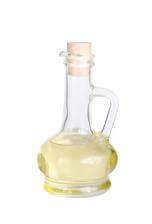Does Vinegar Burn Fat?
Some new research lends support to the old wives’ tale that vinegar burns fat.

Does Vinegar Burn Fat?
The idea of vinegar as a weight loss aid has been around for ages. It’s practically calorie free, of course. And somehow it’s easy to imagine the acidity in vinegar simply dissolving body fat on contact. Of course, things don’t really work that way. Or do they?
Last month, some Japanese researchers found that subjects who ate a high-fat diet that also included vinegar ended up with 10% less body fat than subjects who ate the same diet, minus the vinegar. And just like that, vinegar’s reputation as a weight loss miracle food has been given new legs! This study clearly demonstrates that French fries won’t make you fat if you simply sprinkle a little malt vinegar over them. Isn’t science great?
How Does Vinegar Burn Fat?
So how exactly does vinegar burn fat? Acetic acid is the thing that gives vinegar its characteristic tart or sour quality. According to the Japanese researchers, this compound also does a couple of very special things in the body. First, it activates certain genes that cause your body to store less fat around your waist. Instead the fat is deposited more evenly around the body.
Perhaps more importantly, the researchers concluded that acetic acid appears to increase thermogenesis, which is the process in which you burn body fat to create heat. Things that increase thermogenesis cause the body’s engine to run a little hotter—a little less efficiently, if you will. Increasing thermogenesis burns more calories and that can lead to weight loss.
Will Eating Vinegar Help You Lose Weight?
On the surface, it certainly sounds promising. If acetic acid makes your body burn more calories and store less fat around your waist, then eating more vinegar seems like it could help fight obesity.
But, you know me–always insisting on reading you the fine print. For starters, the subjects in the Japanese study were mice. And unfortunately, things don’t always work out in humans the way they do in mice, as the late Judah Folkman was always eager to point out.
The Truth About Animal Research
If acetic acid makes your body burn more calories and store less fat around your waist, then eating more vinegar seems like it could help fight obesity.
Back in 1998, Dr. Folkman went from being an obscure researcher to a household name overnight when the media announced that he’d found the cure for cancer. Folkman had been working with a therapy called anti-angiogenesis, which cuts off the blood supply to tumors. Folkman was, in fact, curing cancer–in mice.
Unfortunately, as Folkman knew all too well, cancer had been cured in mice many times before. Just never quite so publicly. Hopes (not to mention stock futures) were dashed when Folkman’s therapy–which was an important step forward–still turned out not to be quite as effective in humans as it was in mice.
My point is that animal research is an important first step but we can’t assume that the same results apply to humans.
How Much Vinegar Do You Have to Eat?
Even if we could, there’s another small matter. Though I’m sure humans would be happy enough on the high-fat diet these mice enjoyed, I’m not sure how happy we’d be about the vinegar part of the prescription. To approach the dosage in this study, you’d have to be consuming somewhere in the neighborhood of 20 ounces of vinegar a day. That’s an awful lot of pickles.
Even if acetic acid does turn out to increase thermogenesis in humans the way it does in mice, the magnitude of this effect would probably be too small to lead to noticeable weight loss. It reminds me of the weight-loss strategies I discussed in article # 27, such as drinking ice water and eating negative-calorie foods like celery. Though these do increase your calorie burn, it would take an awfully long time for the extra calories you burn to add up to even one pound of weight loss.
The Health Benefits of Vinegar
While you’re waiting, there is one other way that vinegar might help you battle the bulge. Research–in humans–shows that adding vinegar to a meal slows down the speed at which the carbohydrates are converted to sugar in your bloodstream. And that can help ratchet down your appetite and even reduce your risk of developing diabetes.
So, there may be some benefits to keeping that bottle of balsamic close at hand. But I think we need to keep our expectations realistic.
RESOURCES:
Acetic Acid Upregulates the Expression of Genes for Fatty Acid Oxidation (medical journal article)
Vinegar Improves Insulin Sensitivity to a High-Carbohydrate Meal (medical journal article)
Vinegar image courtesy of Shutterstock

